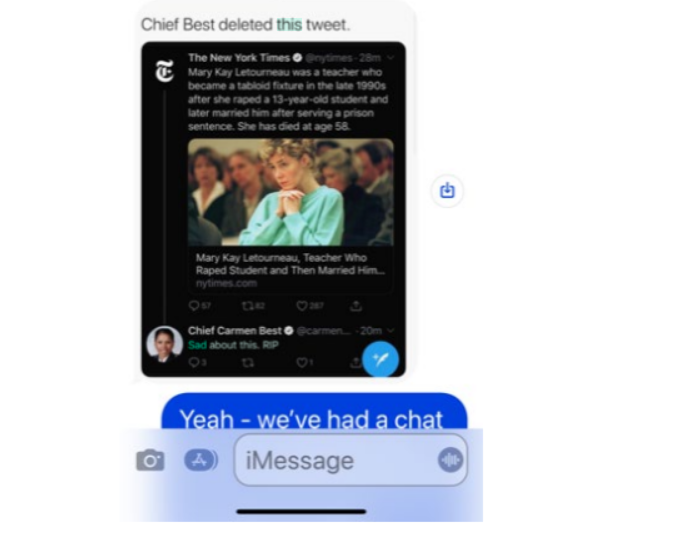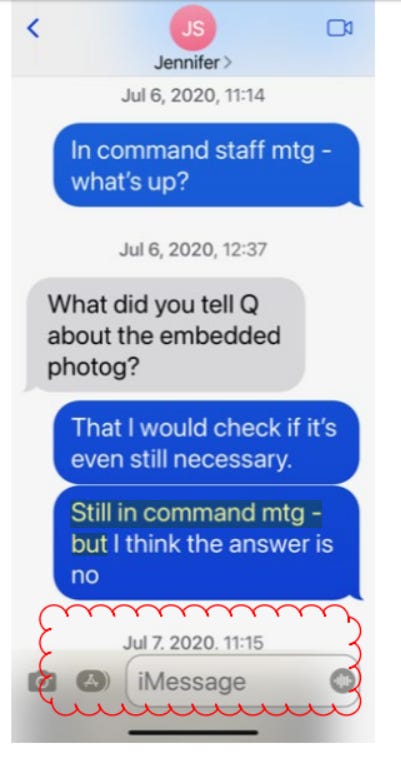City of Seattle to pay $51,250 to settle SPD public records lawsuit

Today, I, Glen Stellmacher, agreed to settle a public records lawsuit with the City of Seattle (City) over the Seattle Police Department’s (SPD) handling of text messages from key employees who were involved in covert infiltration, public relations and intelligence operations during the 2020 protests.
The PDRs at issue
My lawsuit alleged that SPD failed to hand over text messages sent and received from the personal phone of Amy Clancy, who at the time, was SPD’s Director of Strategic Communications.
SPD’s initial response to this request (Request 1) was normal. The department took a normal amount of time to deliver multiple installments of records. However, when SPD claimed to have provided all responsive records, closing the request, I could reasonably dispute this was not the case, and appealed their determination.
The department subsequently provided more text messages from Clancy after my appeal, however it appeared that even more messages were missing.
SPD provided screenshots of the messages from Clancy’s iPhone. At the top and bottom of multiple screenshots, partial bubbles of hidden messages were prevalent throughout the hundreds of pages of records provided by SPD.

Since Clancy held such a high position, and was critical to SPD’s public facing PR apparatus during the protests, I felt it was necessary to take legal action to try and claw back even more records that appeared to be missing.
However, after I appealed my request for Clancy’s text messages, Clancy conveniently quit SPD, taking a job at the City of Tacoma. No longer an employee, SPD could not obtain any more information from Clancy. Within litigation and discovery, no further text messages from Clancy were turned over.
Request 2
As settlement discussions advanced, I also agreed to release SPD from any future liability from a public records request that had sat open and unfulfilled for over two years (Request 2). This request asked for text messages during the 2020 protests from Deb Winsor (Deputy Director of the Washington State Fusion Center), Rik Hall (FBI/SPD Joint Terrorism Task Force Officer involved in covert infiltration of protests) and Grant Ballingham (SPD Lieutenant in charge of SPD’s intelligence operations).
While SPD turned over numerous text messages from Amy Clancy, the department claimed that no text messages existed from Hall or Ballingham. SPD claimed they had retained the physical phones of Ballingham and Winsor, however, “regrettably, no phones were found for Rik Hall.”
When it came to Winsor’s texts, the department claimed it “was unable to access Deb Winsor’s phone, despite repeated efforts to do so, and so effectively the records on that device are not accessible/do not exist. We are unable to determine whether records responsive to your request ever existed on Deb Winsor’s device.”
During the 2020 protests, Winsor spread an official intelligence product from the Washington State Fusion Center on June 5, 2020, that protesters were intentionally using children as “human shields in an attempt to prevent law enforcement from employing pepper spray, tear gas, and other crowd control measures,” after SPD maced a child with OC chemical spray on May 30th, 2020 at Westlake.
Recently, the “human shield” label has disgustingly been used as rhetorical justification for genocide and murder committed by Israeli forces in Palestine. Significant academic analysis, books and reporting has been done surrounding the term and its usage.
In this case, the Washington State Fusion center was acting in a similar vein, justifying the use of chemical weapons on Seattlites by blaming Seattlites for using children as “human shields.” My intent of asking for Winsor’s texts was to determine where this false claim originated.
In responding to Request 2 just prior to litigation settlement, SPD stated that “the named individuals [Ballingham, Windsor, & Hall] no longer work for SPD” as of 09/16/2024. HardPressed has not confirmed this with SPD’s public information officer.
In lieu of litigation, I felt the first step was to file an OPA complaint, alleging that SPD violated the WA State Public Records Act (PRA) in fulfilling Request 1. However, OPA would take 6 months to complete their investigation, and in the end, exonerated themselves from any wrongdoing, despite clear instances of records cut off and missing.
My only forum to claw back the records and for accountability was litigation.
I submitted both Request 1 and Request 2 under two separate and unique pseudonyms.
Litigation
This was the first time I had ever pursued a public records lawsuit and I was fortunate to be expertly represented by Kathy George of Johnston George LLP.
After filing a lawsuit, the City Attorney’s Office (CAO) answered with standard bluster, requesting the court dismiss all claims and award the City attorneys fees for their time on the case. After the City’s rebuttal, we entered the phase of discovery and interrogatories.
We asked the city interrogatory questions, to which the CAO responded consistently by objecting to our questions, calling them vague, overly broad, and unduly burdensome and in multiple cases, claiming our questions were “made for the purpose of harassment.” More bluster.
After discovery, the CAO hinted they would be amenable to a settlement agreement in lieu of proceeding to trial in King County Superior Court.
I went into this process hoping to spur some sort of improvement to SPD’s handling of public records requests. Within a PRA lawsuit, the only way to do that is through a Settlement Agreement. Taking this into consideration, I proposed a list of reasonable reforms the City could undertake to improve transparency, a tenet that countless City officials and SPD chiefs have publicly claimed they care about.
I proposed that:
- The CAO “request a performance audit of SPD’s compliance with the Public Records Act,”
- The SPD “issue an instruction to its public records officers that they should routinely inform requestors about the search conducted for each installment including listing the repositories searched and the dates of the search.”
- The City update its online publication of SPD records processing data of Seattle Police PDRs | City of Seattle Open Data portal, to cover the period since February 2021, including updating the “total time spent (h)” column for each request processed by SPD since February 2021 [this would allow all requesters the ability to see how long SPD had spent processing their requests]
The CAO responded, saying they categorically refused to undertake any agreements to reforms whatsoever, and that they would not be entertaining my requests to increase transparency within the SPD.
Understanding that I did not have unlimited money to keep litigating, and that no improvements to SPD transparency were going to be made through litigation, I decided to settle the case under purely a financial payout of $51,250 including attorney’s fees and financial penalties.
I’ll be using the money to supporting community members in need and to advance HardPressed’ investigative reporting.
Trust me, there are some major reports coming. You’ll want to stay tuned.
Timeline of lawsuit
The timeline below provides a rough sequencing of events as they occurred in this lawsuit.
March 25 - Lawsuit service, filed in King County Superior Court
April 15 - CAO files answer to lawsuit
April 16 - Plaintiff Request for Production (Discovery)
May 16 - CAO Response to request for production (Discovery)
June 21 - CAO Supplemental response to request for production (Discovery)
July 26 - Plaintiff first settlement agreement proposal
August 29 - Draft settlement agreement confirmed with CAO
August 29 - SPD backtracks on settlement agreement
September 13 - SPD and CAO wish to change settlement agreement and financials
September 17 - Final settlement terms offered by CAO
September - Final settlement agreement signed
Total duration - 6 months
Total legal fees - [Will update this post with final number.]

